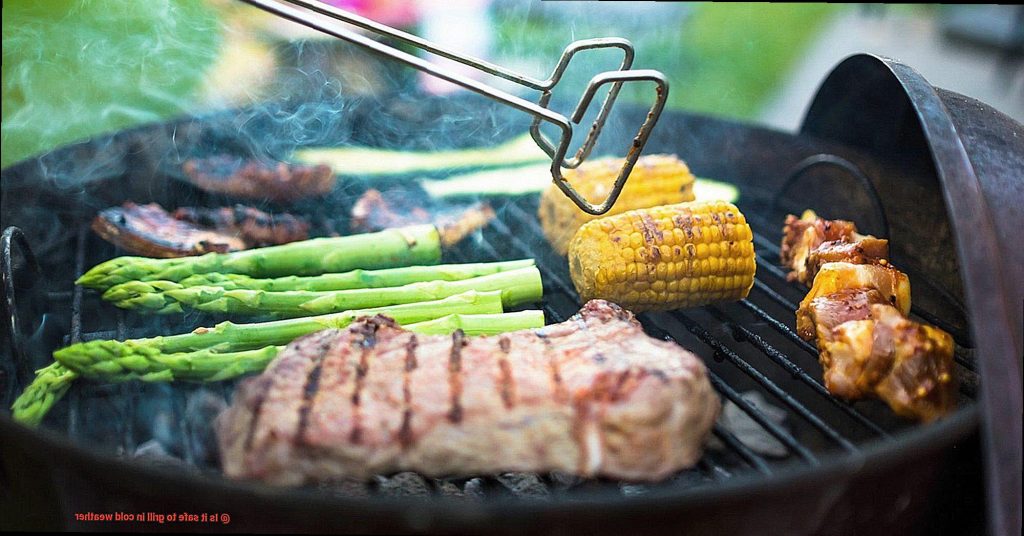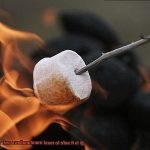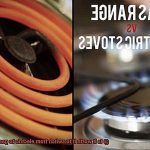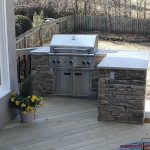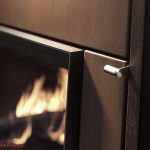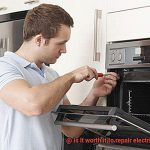When the frosty winter weather sets in, there’s nothing quite like savoring a piping hot grilled meal to warm you up. But, before you fire up the grill, you might be wondering if it’s safe to do so in cold weather. Fear not. With a few precautions, grilling in chilly temperatures can be just as safe and enjoyable as summertime grilling.
The tantalizing aroma and unique flavor of grilled food are hard to resist, but dealing with the cold can be a challenge. That’s why it’s important to keep some vital factors in mind while grilling in cold weather. For example, make sure your grill is sheltered from snow or rain and inspect it for any damage or rust that could affect its performance.
Furthermore, constantly monitor your grill’s temperature as the frigid air can affect cooking time and heat distribution. In this blog post, we’ll share with you all the do’s and don’ts of winter grilling, including safety tips, maintenance recommendations, and cooking techniques that will help you create delicious meals while staying safe.
So let’s get started on our journey to explore the exciting world of winter grilling.
Contents
The Risks of Grilling in Cold Weather
Grilling is a beloved activity that many people enjoy year-round, even in the colder months. However, it’s important to be aware of the risks involved in grilling in cold weather and take the necessary precautions to stay safe.
One of the biggest risks of grilling in cold weather is carbon monoxide poisoning. This colorless and odorless gas can be produced when burning charcoal or gas on a grill. When grilling in cold weather, it’s common for people to move their grill indoors or into enclosed spaces to stay warm. This can lead to a dangerous buildup of carbon monoxide, which can cause symptoms such as headaches, nausea, and dizziness, or even death. To avoid this risk, always grill in a well-ventilated area with plenty of open space around the grill.
In addition to carbon monoxide poisoning, there are other hazards to consider when grilling in cold weather. Slippery surfaces due to frozen grease or liquids on the grill can increase the risk of burns or accidents. Frozen propane tanks or gas lines can also lead to explosions or other hazards. To prevent these risks, it’s important to clean your grill thoroughly before use and store propane tanks indoors or in a heated garage.
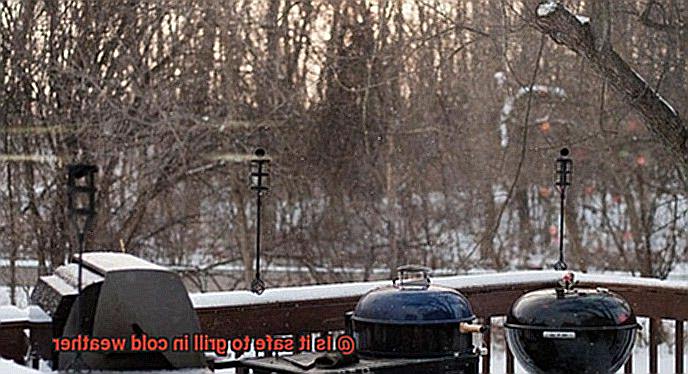
Another consideration when grilling in cold weather is the impact it can have on the quality of your food. Cold temperatures can increase cooking time and make it difficult to maintain a consistent temperature on the grill. This can result in overcooked or undercooked food that may not be safe to eat. To ensure your food is cooked properly and safely, use a meat thermometer and monitor the temperature closely throughout the cooking process.
Carbon Monoxide Poisoning
While it may be tempting to bring your gas-powered grill indoors or into an enclosed space to keep warm while cooking, it’s vital to be aware of the potential risks associated with carbon monoxide poisoning.
Carbon monoxide is a colorless and odorless gas that is produced when fuels such as gas, charcoal, and wood are burned. In high concentrations, it can cause headaches, dizziness, nausea, and even death. One of the primary causes of carbon monoxide poisoning during grilling is using gas-powered grills in enclosed spaces or areas with poor ventilation.
To prevent carbon monoxide poisoning while grilling in cold weather, here are some tips:
- Always use your grill outdoors in a well-ventilated area. Keep the grill away from enclosed spaces like garages or sheds.
- Regularly check your grill for any signs of damage or wear and tear that could potentially cause a gas leak. A gas leak can increase the risk of carbon monoxide poisoning, so it’s crucial to ensure that your grill is in good working order before using it.
- Install a carbon monoxide detector in your home or outdoor cooking area. This device will alert you if levels of carbon monoxide become dangerously high, giving you time to evacuate the area and seek medical attention if necessary.
Fire Hazards
Calling all grill masters. Are you ready to brave the cold and grill up a storm? While it may be tempting to fire up your propane grill and get cooking right away, it’s crucial to understand the potential fire hazards that come with grilling in colder weather.
First on our list of concerns are the dangers posed by snow and ice buildup around your grill. Not only can it make accessing your grill more challenging, but it can also destabilize it, leading to a dangerous tipping hazard. It’s important to clear any accumulated snow or ice from around your grill before lighting it up.
Next up is the threat of propane tanks malfunctioning due to extremely low temperatures. Propane tanks are designed to function within specific temperature ranges, and cold weather can cause them to become less efficient or even fail altogether. Regularly checking your propane tank for damage and ensuring that it’s functioning correctly is essential in avoiding leaks or fires.
Another potential hazard when grilling in chilly weather is the use of flammable materials like paper plates or napkins. With the wind blowing these items around, they could easily come into contact with hot surfaces, causing a fire. To avoid this risk, opt for non-flammable materials like metal plates and utensils instead.
Propane Tank Precautions
If so, it’s crucial that you take some extra precautions with your propane tank to avoid any unpleasant surprises.
First and foremost, keep your propane tank warm. When the temperature drops below 40 degrees Fahrenheit, the pressure inside the tank can decrease, causing your grill to malfunction or even shut off completely. To avoid this, store your propane tank in a warm location, like a garage or shed, and wrap it up in a thermal blanket or insulated cover. This will ensure a steady temperature and keep the pressure from dropping too low.
In colder weather, it’s also essential to check the level of your propane tank more frequently. Changing temperatures can cause pressure changes inside the tank, so it’s crucial to keep an eye on the level to prevent running out of gas mid-grill. And speaking of pressure changes, ensure that all connections between your propane tank and grill are tight and secure. Loose connections can lead to gas leaks and potentially dangerous situations.
To check for leaks, mix equal parts water and dish soap and apply the solution to all connections. If bubbles form, you have a leak and should immediately shut off the gas. Safety should always come first.
Cleaning and Maintenance Tips for Grilling in Cold Weather
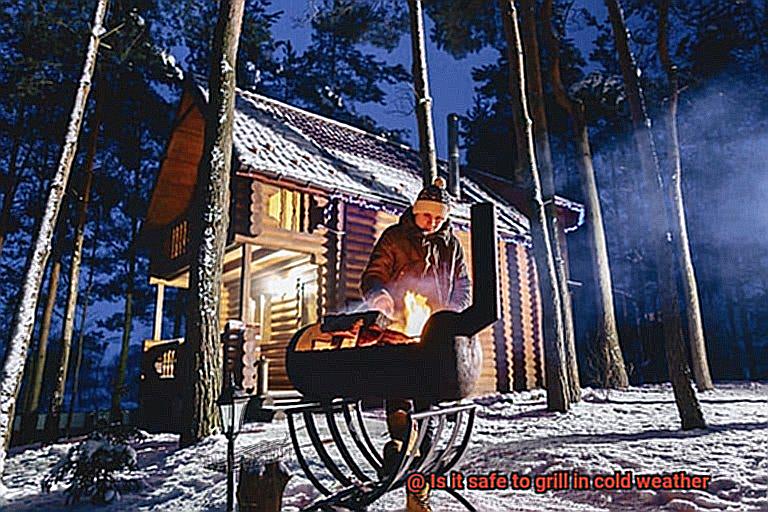
When grilling in cold weather, it’s essential to prioritize cleaning and maintaining your grill to ensure safety and optimal performance. Cold temperatures can cause debris to build up inside your grill, posing a fire hazard and affecting its overall functionality. Here are five essential sub-sections to consider when cleaning and maintaining your grill during the colder months:
Thoroughly Clean Your Grill
Before each use, remove any leftover food particles, greasy buildup, and ash from the previous use. Use a wire brush or scraper to remove stubborn residue and ensure that both the grates and interior of the grill are clean.
Check Burners and Igniters
Cold weather can cause the burners and igniters of your grill to become clogged or damaged, leading to potential safety hazards. Check these components before each use and clean them if necessary.
Inspect Propane Tank and Hoses
The cold weather can cause propane tanks and hoses to become brittle, making them more prone to wear and tear. Inspect these components for leaks or damage before each use.
Protect Your Grill from the Elements
Invest in a grill cover or store your grill in a sheltered area when not in use to prevent rust and other forms of damage that can compromise safety.
Follow Safe Grilling Practices
Read the manufacturer’s guidelines for safe grilling, and never leave your grill unattended while in use. Use appropriate tools and accessories, such as heat-resistant gloves and long-handled utensils, to prevent burns and other injuries.
Clothing Considerations for Grilling in Cold Weather
It’s essential to consider your clothing when you venture out to grill. Proper attire can make all the difference in ensuring your comfort, safety, and the quality of your food.
The key to dressing for cold weather grilling is layering. Start with a moisture-wicking base layer that will keep sweat away from your skin and prevent you from feeling damp and chilly. Add an insulating layer like a fleece or down jacket to trap heat close to your body. Finally, top it off with a windproof and waterproof outer layer to shield you from the elements. By dressing in layers, you can adjust your clothing as needed while moving between the warmth of the grill and the cold air outside.
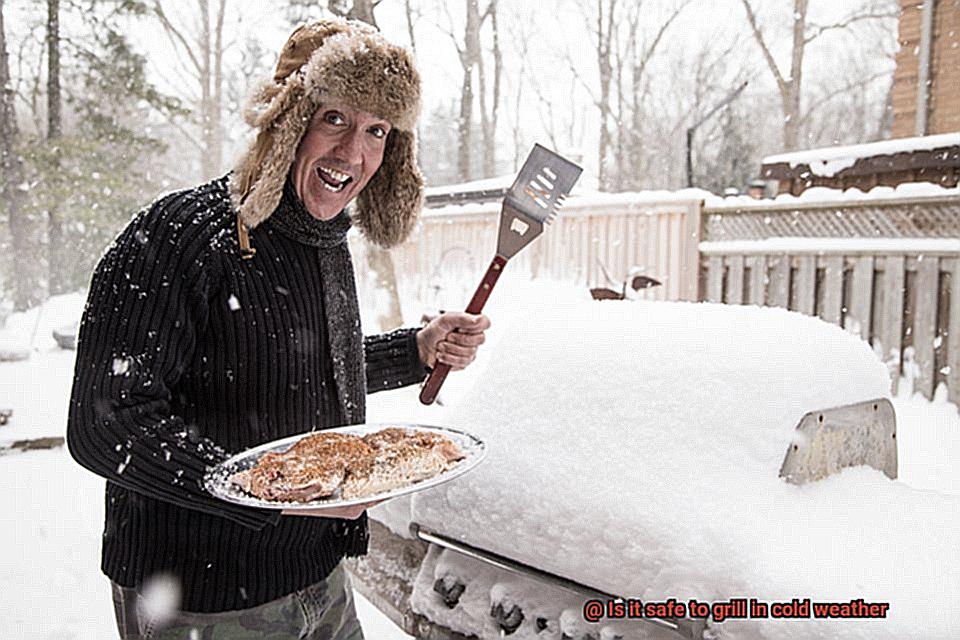
Don’t forget about your extremities. Your hands, feet, and head are particularly vulnerable to the cold, so be sure to wear gloves, warm socks, and a hat. Opt for wool or synthetic materials for gloves and socks since they retain heat even when wet. A hat will not only keep your head warm but will also reduce heat loss from your body.
However, loose clothing can pose a hazard when grilling. Be sure that your clothing is loose enough to allow for easy movement but not so loose that it gets caught on anything while cooking. Avoid wearing anything that dangles or dangling jewelry since it can get caught in the grill or catch fire.
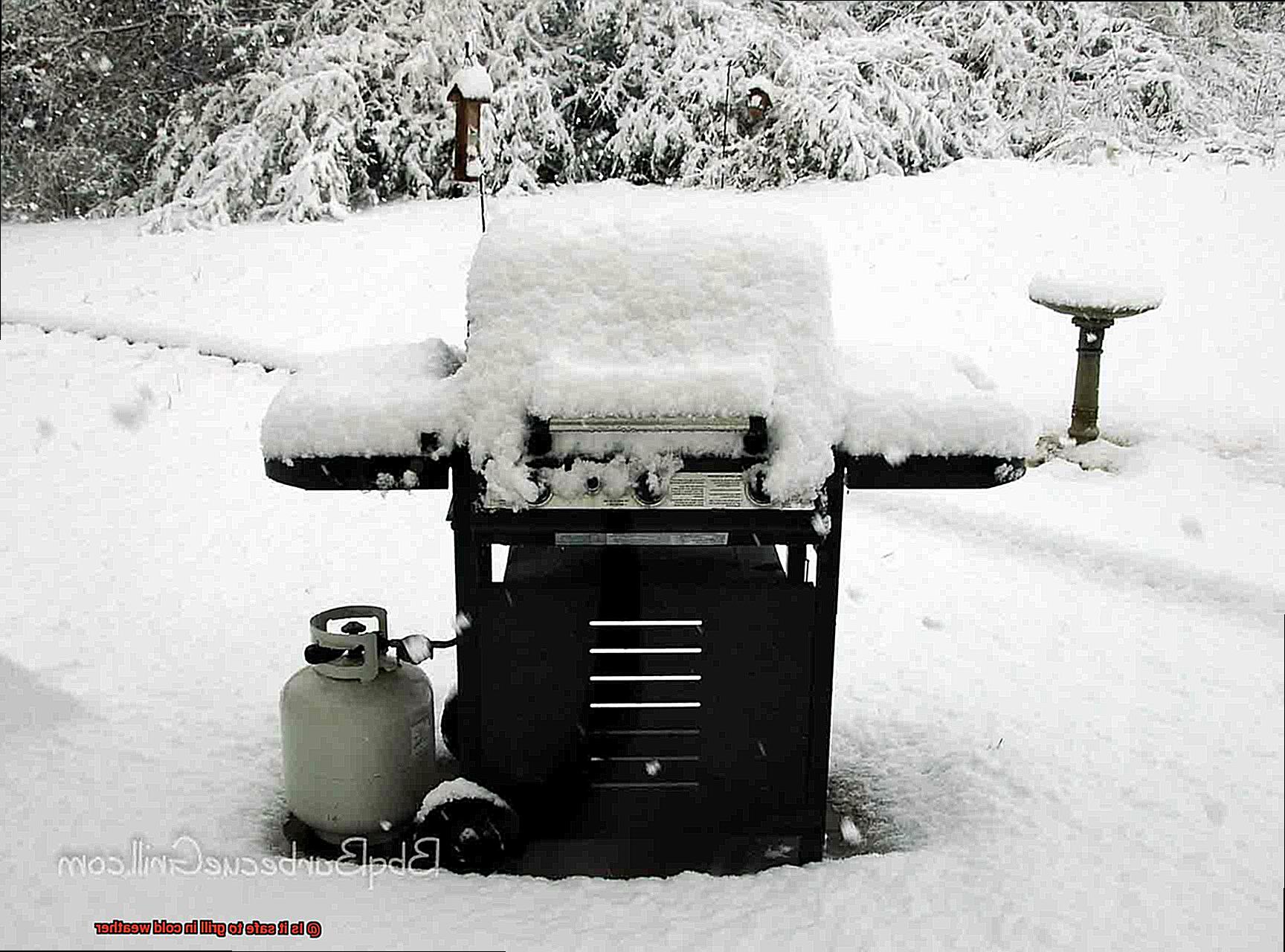
Food Safety Guidelines for Grilling in Cold Weather
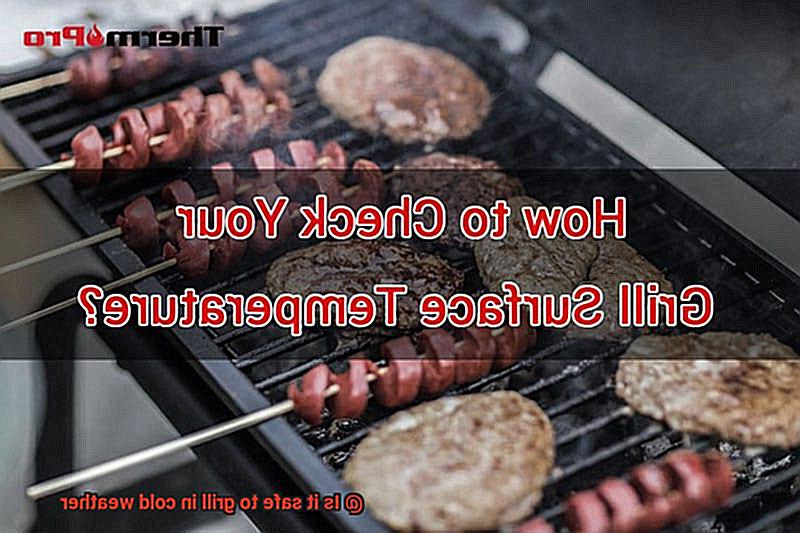
Grilling in cold weather can be an exhilarating way to enjoy a meal, but it’s crucial to prioritize food safety. With the temperature dropping, it can be challenging to ensure that your food is cooked thoroughly, and bacteria can thrive in these conditions. However, by following these five food safety guidelines, you can have a safe and enjoyable grilling experience in cold weather.
- Keep your grill clean: Before using your grill, make sure to clean it thoroughly. Leftover food debris or grease from previous grilling sessions can encourage the growth of bacteria, leading to contaminated food and potential illnesses.
- Check the temperature of your grill: Cold weather can affect the heating of your grill, so it’s essential to check the temperature regularly. This will ensure that your food is cooking at the right temperature, preventing harmful bacteria from growing.
- Use a food thermometer: To ensure that your meat is cooked thoroughly and safe to eat, use a food thermometer. Don’t rely on guesswork as it could lead to undercooked meat and potential health risks.
- Keep food covered: Keeping your food covered as much as possible is crucial when grilling in cold weather. This helps maintain the temperature of your grill and prevents bacteria from growing on your food. Consider investing in good-quality covers for your grill or using aluminum foil.
- Don’t leave food out for too long: In cold weather, it’s easy to assume that food won’t spoil as quickly as it would in hot weather. However, bacteria still thrives between 40°F and 140°F, so don’t leave your food out for too long. Store it properly after grilling to prevent contamination.
Additional Safety Tips for Grilling in Cold Weather
When it comes to grilling in cold weather, it’s important to keep safety at the forefront of your mind. Here are five additional safety tips to help ensure that everything goes smoothly:
Proper Placement
Before you start grilling, make sure your grill is placed on a level surface away from anything that could potentially catch fire, such as trees, bushes or dry grass. This is especially important in cold weather when the ground may be uneven or slippery due to ice or snow.
Keep Your Grill Clean
In cold weather, snow and ice can accumulate on your grill, and grease and debris can build up quickly. This not only creates a fire hazard but also increases the risk of flare-ups. Be sure to clean your grill thoroughly before each use.
Monitor Heat Levels
Cold weather can cause fluctuations in temperature, so keep a close eye on your grill throughout the cooking process. Regularly check the heat levels and adjust them as necessary to ensure that your food is cooking evenly.
Use Long-Handled Utensils
When grilling in cold weather, always use long-handled utensils to keep your hands safely away from the flames. This will help prevent accidents and burns.
Properly Extinguish Flames
When you’re finished grilling, don’t simply turn off the gas or douse the coals with water. Instead, use a fire extinguisher designed for outdoor fires to properly extinguish the flames. Once the flames are out, allow the grill to cool completely before attempting to move or store it.
LGLk6tqoZrg” >
Also Read: Can a Weber BBQ Grill Get Wet If left Outside in Rain?
Conclusion
In conclusion, don’t let the cold weather stop you from enjoying a delicious grilled meal.
With proper precautions, grilling in winter can be just as safe and enjoyable as summertime grilling. However, it’s important to keep in mind the potential risks and take necessary safety measures to ensure a safe and successful grilling experience.
This includes ensuring proper ventilation to avoid carbon monoxide poisoning, checking for leaks, cleaning and maintaining your grill, dressing appropriately for the weather conditions, and following food safety guidelines. Remember that snow and ice buildup around your grill can pose fire hazards, so it’s essential to keep your grill area clear of any potential obstacles.
By using long-handled utensils, monitoring heat levels closely, properly extinguishing flames when finished grilling, and placing your grill in a safe location away from flammable materials, you can enjoy a warm winter meal without any worries.

